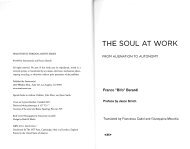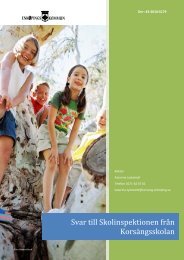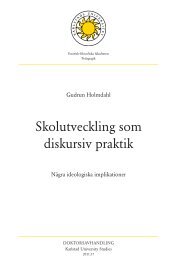FULLTEXT01
FULLTEXT01
FULLTEXT01
You also want an ePaper? Increase the reach of your titles
YUMPU automatically turns print PDFs into web optimized ePapers that Google loves.
e weighed against the negative consequences for those concerned by apossible publication‟ (p.15, own translation). In the Swedish Research Council'sedition Good research manners it is said: „In a narrow sense requirements of goodscientific quality are met when the research provides new knowledge, revealsnever before known circumstances or sheds new light on previously knownphenomena and relationships‟ (2011, p. 24, own translation). However, what isgood quality can only be determined based on an overall assessment and assuch also ethical considerations must be included.In my opinion, a researcher has both a kind of freedom and a kind of duty tomake selections on, among other things that point, and of course he or sheshould be able to motivate the choices. It may, for instance, be perceived asprovocative to have participated in an investigation and transferred time andenergy which is necessary to answer a questionnaire and then find your ownanswer in a new frame, provided with other meanings than the „intended‟.However, Wetherell and Potter (1992) point out that a researcher also needs tofollow his or her whims in a study like this. One such „whim-incident‟ was whenI, while working with my analysis, came in contact with a collection of lecturesby Bauman (1999), and I considered it as relevant to organize and dramatize thematerial around those. Thus, those selections from Bauman's texts provide anintrigue around which my results have been dramatized, and by whichideological implications of school development as a discursive practice are alsoilluminated. They also work as introductions - framed vignettes - to each offour tableaus in the presentation of these results.ResultsThe analysis has led to four so-called tableaus. Beside a vignette consisting of aframed text by Bauman (1999), which is foremost meant to illustrate ideologicalimplications that school development as a discursive practice may constitute,each respective tableau consists of three or four connected combinations ofinterpretative repertoires and ideological dilemmas. The tableaus (in italics) andtheir combinations of interpretative repertoires and ideological dilemmas arepresented in the following order: School development as social engineering; those whodeal and those who are „dealt with‟; conditional or unconditional freedom;activity against inertia / laziness. School development as establishing and discrediting ofthe Other; good and bad traits; good and bad behavior; change agents againstreactionaries. School development as truth claims; authenticity against falsehood; real181






